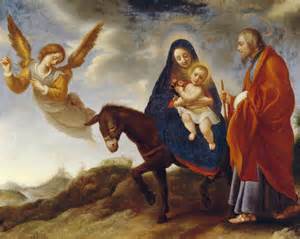
Matthew 2:13-23
When we think of Christmas, we naturally think of the mood as fun, festive, and laughter. However, what the Bible says about the surrounding events of the birth of Jesus is anything but fun and laughter. Instead, it was dark, demonic, and deadly. It is something that many people want to forget, as we shall see why in a minute.
Out of the four Gospel writers, only Matthew has recorded the events of escaping into Egypt and killing the innocent boys in Bethlehem.[1] From a human perspective, this particular biblical narrative is dark, demonic, deadly, and devastating. Yet there is a turning point, a climax of the story, a defining moment in this portion of the redemptive history.
The central theme here is that God will always win, and Christ the King cannot be eliminated because he is matchless, unrivaled, and incomparable. And to see all of that as a whole picture is like putting the pieces of puzzles together. And each part of the puzzle is an important event when putting it together collectively with other details to give a glorious picture of Jesus and the theme of Christmas. And that is the goal of this sermon. Let us begin with the first event.
1. Intervention by God (v. 13)
Notice God’s intervention by his revelation for his provision and protection. That is a loaded sentence!
God reveals his plan to Joseph through an angel of the Lord in a dream. This is the second dream in which Joseph received God’s intervention by revelation (1:20). However, this is the third dream in Matthew’s Gospel so far in which God’s plan is revealed through a dream (1:20; 2:12).
What’s happening in our text is descriptive, not prescriptive. Matthew is merely describing a historical account here, not prescribing for us to know God’s will through dreams. It is not a normative practice for Christians to seek dreams for God’s will. What is happening in Matthew 2 was during a particular time when the Bible wasn’t complete. But now, if you want to know God’s objective will, then seek God’s word instead. The word of God is far more superior and sure than dreams and visions (WCF 1.1).
The purpose of God’s intervention is not only to protect Joseph and his wife Mary from Herod but, most importantly, for God the Father to protect his Son, Jesus. So, an angel of the Lord commanded Joseph to take the child and the mother and flee to Egypt.
Isn’t God’s timing perfect? God intervenes when he sees the need.
Today God is still in the business of intervention with his revelation every week, namely through the preaching of his word. And why? Like this narrative, for provision and protection.
2. Obedience of Joseph (vv. 13-15a)
God’s commands to Joseph are clear in four words in verse 13: “Get up, take, flee, and remain.” Those are not God’s four suggestions, but God’s four commands. And Joseph’s obedience is clearly seen in verse 14: “So Joseph got up, took, and left.” In verse 15, the text reads: He remained there until the death of Herod. Joseph represents what Christians do – obedience to God’s word.
According to Calvin, the fact that Joseph obeyed God’s commands and stayed in the foreign land until Herod’s death shows the perseverance of Joseph’s faith.[2] Also, Charles Spurgeon said, “The Lord’s servants must wait for the Lord’s word before they make a move, whether it be to go abroad or to come home. Waiting is hard work, especially waiting in Egypt, but it is safe to tarry till we have our marching orders.”[3]
Joseph represents what Christians do – obedience to God’s word. When you learn God’s truth, you must faithfully, joyfully, and immediately obey them. And you obey, especially when things are difficult. Your obedience to God is not based on how you feel. Your obedience to God is based on what he says in the Bible.
In what ways are you obeying God’s word at this time?
- Are you faithfully committed to keeping the Lord’s Day holy by gathering with God’s people every week? Or do you allow other things to take precedence? What part of “do not forsake assembling together, as is the habit of some” in Hebrews 10:25 you do not understand? What kind of message do you give to others when you allow work, recreation, and other things to come before worshipping God on the Lord’s Day with your local church? In what ways are you obeying God’s word?
- In what ways are you obeying God’s word about being committed to learning and studying God’s word? Why aren’t you taking advantage of Friday Night Bible Study and/or Foundations of Faith class? What part of “Study to show yourself approved unto God, a workman that needs not to be ashamed, rightly dividing the word of truth” in 2 Tim. 2:15 do you not understand, yet you want to be a leader?
- In what ways are you training up your children and modeling for them? Prov. 22:6 says, “Train up a child in the way he should go.” In what ways are you training up your child in the way he/she should go regarding how to worship God, how to pray, how to listen to God, how to serve God in the context of the local church?
- In what ways are do you support and submit to the spiritual leadership that God has sovereignly placed you under? In what way do you have accountability with your pastor? Or do you listen more and support others who are not your pastor? What part of “Obey your leaders and submit to them, for they keep watch over your souls as those who will give an account. Let them do this with joy and not with grief, for this would be unprofitable for you” in Heb. 13:17 you do not understand?
3. Fulfillment of the Prophecies (v. 15b)
One of the keywords in Matthew’s Gospel is “fulfilled.” Matthew uses this verb repeatedly throughout his writing. The reason for this repeated emphasis is to show how the fulfillment of what God promised in the OT came about. And you see that throughout Matthew. Here in our text alone, he mentions three OT fulfillments (vv. 15, 17, 23).
Perhaps this is a good place to mention the NT interpretation of the OT briefly. In other words, how do the NT writers interpret the OT? For instance, in verse 15, how did Matthew use Hosea 11:1 to mean the fulfillment of prophecy concerning the Messiah? Granted, the writers were under the inspiration of the Holy Spirit. But how do we today interpret the OT in light of the NT?
In Bible interpretation, one of the things to pay attention to is identifying and interpreting “types.” Typology is when “the NT looks back to a number of persons, things, and events in the OT and treats them as foreshadowing then-future persons, things, and events.”[4] More than 10 percent of the NT is made up of citations or direct allusions to the OT. By quoting the OT frequently, the NT writers demonstrated their trust and confidence in the OT.[5]
Sometimes the NT writers referred to individuals, things, and events in the OT and then stretched those texts or contexts beyond their original historical setting to refer to Christ. And such is the case in Matthew 2:15. Historically and contextually, Hosea 11:1 is a reference to Israel, which is also called God’s son in Exodus 4:22. But Matthew goes beyond the historical and contextual setting to give Christological or Christ-centered interpretation using Israel as a type of Christ. According to D.A. Carson, “The NT writers insist that the OT can be rightly interpreted only if the entire revelation is kept in perspective as it is historically unfolded.”[6] And this method of Bible interpretation is called the redemptive-historical approach. That is to say, interpret the Scripture in light of the gospel and Christ. That is what a Christ-centered interpretation is. Jesus said in John 5:39 that the Scripture testifies about him. After all, Jesus is the center of the entire redemptive history of the Scripture. Another way to look at it is that the OT is the preview of the NT, whereas the NT is the OT’s fulfillment.
4. Demonic Extermination (vv. 16-18)
Even though Herod is an unbeliever, Herod’s action in Matthew 2:16 goes beyond the standard of what non-Christians do. That is to say, even in the eyes of unbelievers, what Herod did is evil and wicked like Hitler.
Isn’t it interesting that even those who reject the notion of absolute and objective truth, such as non-Christians, do have specific standards of morality? In other words, even non-Christians who reject the moral standards of biblical teaching do have standards of what is evil and wicked like Hitler?
How do we Christians explain when some people like Hitler, Herod, and others do evil and wicked things beyond what non-Christians do? According to Scripture, this kind of evil act is influenced outside of an unbeliever’s normative behavior. In other words, this action is beyond depraved mind, but demonic. In John 8:43-44, Jesus speaking to the Pharisees, made this jaw-dropping comment:
NAU John 8:43 “Why do you not understand what I am saying? It is because you cannot hear My word. 44 “You are of your father the devil, and you want to do the desires of your father. He was a murderer from the beginning, and does not stand in the truth because there is no truth in him. Whenever he speaks a lie, he speaks from his own nature, for he is a liar and the father of lies.
Peter also said, “Be of sober spirit, be on the alert. Your adversary, the devil, prowls around like a roaring lion, seeking someone to devour” (1Pet. 5:8).
At the end of the day, Herod is responsible for his own wicked actions. At the same time, there is a demonic influence that cannot be ignored. Biblically and historically, some individuals have been demonically influenced to stop God’s plan and the work of God. The Scripture is clear:
NAU Ephesians 6:12 For our struggle is not against flesh and blood, but against the rulers, against the powers, against the world forces of this darkness, against the spiritual forces of wickedness in the heavenly places.
What we see in Matthew 2:16 is a horrific picture of the demonic extermination of innocent Jewish boys under the age of two. Flashing swords, screaming moms, flowing drops of blood are the dark side of the Christmas story.[7]
The Christmas carol “O Little Town of Bethlehem, how still we see thee lie” is not the case, but now, “O Little town of bedlam (chaos), how deep we hear thy cry.” It is no longer shepherds running through the streets, but now soldiers marching in the streets. The joy of peace on earth is now replaced by piercing swords. The silent night became a screaming night. The blood is flowing, babies are dying, and the parents are weeping. That’s the dark side of Christmas.[8] According to Matthew, this is another fulfillment of the OT prophecy, namely from Jeremiah 31:15, which says:
Thus says the LORD,
“A voice is heard in Ramah,
Lamentation and bitter weeping.
Rachel is weeping for her children;
She refuses to be comforted for her children,
Because they are no more.”
According to a Bible commentator, Rachel’s tomb was near Bethlehem. And Rachel was considered by many to be the mother of the nation of Israel. That is why she is seen weeping over these children’s deaths.[9]
5. The Divine Elimination (vv. 19-20)
Like verse 13, we see here God’s intervention. But this time, it is God’s intervention by elimination, namely the elimination of Herod. Verse 19 says Herod died.
The lesson here is that no one (including evil ruler or demonic influence) can frustrate the will of God. God’s plan cannot be frustrated or hindered by anyone. God will always accomplish his sovereign plan and purpose. And God will always eliminate anyone who tries to hinder God’s work and plan.
NIV Isaiah 13:11 I will punish the world for its evil, the wicked for their sins. I will put an end to the arrogance of the haughty and will humble the pride of the ruthless.
Notice the contrasts between Herod the king and Jesus, the king:
- Herod, an epitome of a selfish and self-indulgent ruler; Jesus, a self-denying and self-sacrificing ruler.
- Herod, ruled by Satan. Jesus, the ruler of Satan.
- Herod the destroyer. Jesus the Savior.
- Herod, the cruel murderer of little ones. Jesus, the one who calls little ones to him.
- Herod, in the end, losing all. Jesus, still in control overall.[10]
6. Supremacy of Jesus Christ (vv. 21-23)
In his writing, Matthew repeatedly points out the supremacy of Jesus Christ over everyone, including his mother, Mary. For example, in verse 11, it was to Jesus the worship is directed, not to Mary. It was to Jesus the gifts were presented, not to Mary. This type of example is shown throughout Matthew’s writing, especially how Jesus is mentioned first and before his mother, Mary. Not once Mary is mentioned or preferred before Jesus (vv. 13, 14, 20, 21).
All that to say, Matthew’s goal in his writing is to show the supremacy of Jesus Christ. But that’s not only true in Matthew 2. You recall in the genealogy how Christ is better and superior to anyone else. For instance, Jesus Christ is mightier and better king than David. Jesus is more faithful than Abraham, the father of covenant faith. Jesus is wiser than Solomon. Jesus is supreme over everyone that is mentioned in the genealogy. Jesus is the greatest in all history. We don’t need dreams or visitations from an angel to believe all of that because we have more sure revelation because we have the words of Christ.
Furthermore, according to Matthew 2, Jesus Christ crushed the demonic influence and plans of Herod. No man, no power, no force is a match to our Lord Jesus Christ. Herod thought he could eliminate Jesus. But guess what? He got eliminated! In this world, there are only two wills: God’s will and man’s will. Guess what? The will of God always prevails. The story’s central theme is that God will always win, and Christ the King cannot be eliminated because he is matchless, unrivaled, and incomparable. And that is perhaps the most important lesson that Christmas teaches.
I would like to echo the words of Paul regarding the supremacy of Christ in Colossians 1:15-18. It says:
NAU Colossians 1:15 He is the image of the invisible God, the firstborn of all creation. 16 For by Him all things were created, both in the heavens and on earth, visible and invisible, whether thrones or dominions or rulers or authorities– all things have been created through Him and for Him. 17 He is before all things, and in Him all things hold together. 18 He is also head of the body, the church; and He is the beginning, the firstborn from the dead, so that He Himself will come to have first place in everything.
Do you know him? Would you like to know him, the main reason for this season?
8 But what does it say? “THE WORD IS NEAR YOU, IN YOUR MOUTH AND IN YOUR HEART” — that is, the word of faith which we are preaching, 9 that if you confess with your mouth Jesus as Lord, and believe in your heart that God raised Him from the dead, you will be saved; 10 for with the heart a person believes, resulting in righteousness, and with the mouth he confesses, resulting in salvation. 11 For the Scripture says, “WHOEVER BELIEVES IN HIM WILL NOT BE DISAPPOINTED.” 12 For there is no distinction between Jew and Greek; for the same Lord is Lord of all, abounding in riches for all who call on Him; 13 for “WHOEVER WILL CALL ON THE NAME OF THE LORD WILL BE SAVED.”
To watch this sermon, you may click here.
[1]John MacArthur, The MacArthur Bible Commentary (Nashville, Ten.: Thomas Nelson, 2006), 1114.
[2]John Calvin, “Harmony of Matthew, Mark, and Luke,” translated by William Pringle in Calvin’s Commentaries (Grand Rapids: Baker, 2003)16:162.
[3]Charles Haddon Spurgeon, The Gospel of Matthew (Grand Rapids: Revell, 1987), 25.
[4]Roy B. Zuck, Basic Bible Interpretation (Colorado Springs, Co.: Chariot Victor Publishing, 1991), 169.
[5]Ibid., 252.
[6]D.A. Carson, “Matthew” in The Expositor’s Bible Commentary, edited by Frank E. Gaebelein (Grand Rapids: Zondervan, 1984), 92-93.
[7]Jon Courson, Matthew Vol. 1, 1-13 (Jacksonville, Oregon: Tree of Life Publishing, 1993), 30.
[8]Ibid., 33.
[9]Louis A. Barbieri, “Matthew” in The Bible Knowledge Commentary, edited by John F. Walvoord and Roy B. Zuck (Colorado Springs: Cook, 2000), 23.
[10]William Hendriksen, Matthew (Grand Rapids: Baker Book House, 2002), 193.

